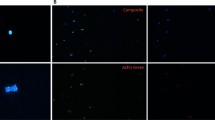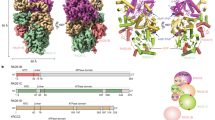Abstract
STUDIES of aqueous systems of intact deoxyribonucleoproteins1 showed that they were markedly unstable. Storage at 2°–5° C. for 24–36 hr. produced a substantial depolymerization of the deoxyribonucleic acid component. This is in marked contrast to the stability of dissociated nucleoproteins in 1.0 M sodium chloride. It was felt that this instability might be functionally significant in the mechanism of radiation effects on biological systems. Studies were therefore made of the effects of X-radiation on aqueous nucleoprotein gels.
This is a preview of subscription content, access via your institution
Access options
Subscribe to this journal
Receive 51 print issues and online access
$199.00 per year
only $3.90 per issue
Buy this article
- Purchase on SpringerLink
- Instant access to full article PDF
Prices may be subject to local taxes which are calculated during checkout
Similar content being viewed by others
References
Bernstein, M. H., and Mazia, D., Biochim. Biophys. Acta, 10, 600 (1953); 11, 59 (1953).
Kaufmann, B. P., et al., Carnegie Institution of Washington Year Book No. 50, 203 (1951).
Author information
Authors and Affiliations
Rights and permissions
About this article
Cite this article
BERNSTEIN, M. Deoxyribonucleoproteins of Cell Nuclei: Sensitivity to X-Rays. Nature 174, 463 (1954). https://doi.org/10.1038/174463a0
Issue date:
DOI: https://doi.org/10.1038/174463a0
This article is cited by
-
A new method suggested for breeding fruit trees resistant to virus diseases
Tijdschrift Over Plantenziekten (1956)



